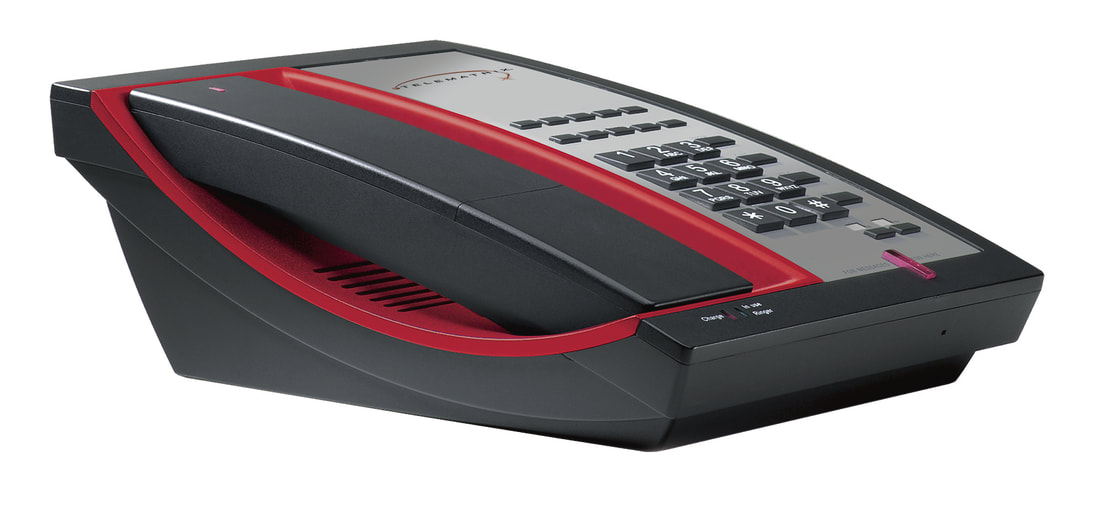Cetis eNewsletter
|
Do you VoIP?
Choose from four families of VoIP hotel phones designed to match any decor and style.
Four design families of feature-rich VoIP hotel phones from the Teledex and TeleMatrix brands offer certified compatibility, extreme reliability, and great value for any hospitality application. A full range of form factors are available from guest phones and trimlines to lobby phones and cordless models. Choose Teledex M Series, E Series, and I Series, or TeleMatrix 9600|3300 Series models, available in 1 and 2- line, corded, and cordless desk configurations with matching VoIP trimline, and RediDock remote cordless handset stations. The Cetis brands of phones are recognized worldwide as the best choice in hospitality. Click here to view Cetis VoIP telephone models, and to request a quotation for your next property renovation or new construction project.
Guestroom phones outdated?
Cetis can help you update your guestroom phones to the latest styles.
|
If, discolored, tangled cords, malfunctioning LED lamps, or worn buttons, describe your current hotel phones then it's time to upgrade.
We can help! Each of the Cetis brands is distinctive for its design, engineering, reliability, functionality, and competitive pricing. Click here to browse designs, here to request a consultation, or here to request a quotation. |
We are listening!
Cetis global Sales and Customer Service teams are now the best in the industry.

Thank you customers everywhere!
The Cetis global Sales and Customer Service teams strive daily to ensure you receive the best service possible. We stand ready to listen and assist with day-to-day orders and support requirements.
How can we help you today?
Click here to request assistance, or here to request a quotation for your next property renovation new construction project. We look forward to serving you.
Samples • Data sheets • Brand standards • SIP support • Faceplates • Warranty • RMA
The Cetis global Sales and Customer Service teams strive daily to ensure you receive the best service possible. We stand ready to listen and assist with day-to-day orders and support requirements.
How can we help you today?
Click here to request assistance, or here to request a quotation for your next property renovation new construction project. We look forward to serving you.
Samples • Data sheets • Brand standards • SIP support • Faceplates • Warranty • RMA
Building a strong brand!
Building a strong brand one phone at a time.
|
A history of Cetis branding
Cetis, Inc., formed through the 2006 merger of Scitec and TeleMatrix, and the 2009 acquisition of Teledex assets, designs and manufactures a broad range of analog and VoIP hotel phones. In 1982 we introduced the first Teledex brand hotel phones with programmable guest service keys and a customizable faceplate area. Teledex Diamond Series hotel phones, which continue to be recognized as the most popular hotel phones in the world. Hundreds of Cetis channel partners have installed more than 30 million Teledex, TeleMatrix, and Scitec telephones at 100,000+ locations globally. Today, Cetis is going strong and building it's brand one phone at a time. Click here to order your Cetis brand hotel phones. |
Hotel-Online News
COVID-19 and Hospitality: 7 Alternative Ways to Cut Costs and Save Your Business…BEFORE Resorting to Layoffs

By Nicki Dehler
The hospitality industry is entering uncharted territory. As concerns surrounding the continued transmission of COVID-19 continue to mount, we find ourselves isolated in our homes, unsure of when this pandemic will pass. What does the future hold for our communities? Moreover, what will this crisis mean for those businesses who have ceased operations due to recent recommendations and mandates for complete shutdowns?
There is no denying that from a business perspective, travel and hospitality have taken the brunt of the pandemic’s economic impact. Hotels and airline companies have suffered unprecedented losses as escalating numbers of cases spark travel bans and social distancing protocols across the globe. This is a frightening and uncertain time for many of us. However, let me remind you: Our industry has pulled its way through many economic and political hardships, most notably including 9/11 and the 2008 Great Recession. While each of these crises presented the travel industry with enormous short-term challenges, we have always emerged stronger on the other side.
That being said, we also recognize that the situation which stretches before will likely be a marathon, not a sprint. While we cannot make any concrete assertions about the timelines we face, the insights gathered from other communities around the globe indicate that containing COVID-19 will take time. How much? We can’t know for sure. All we can do is prepare for the worst while hoping for the best, and work to protect our businesses and our employees to the best of our ability.
And the long-term trends look rosy: By 2030, 5.3 billion people will join the ranks of the global middle class, with spending growing from $37 trillion in 2017 to $64 trillion in 2030. While coronavirus will certainly depress the travel market in the short term, this expanding middle class will be an unstoppable force for growth in the travel industry. And much of this growth will be in Asia, with China and India representing over 43% of the global middle class by 2030. In fact, China is already in the early stages of an economic rebound, according to some indications. Many Chinese companies have already moved beyond crisis response to recovery and post-recovery planning.
The evolving COVID-19 situation is daunting and complex—but by no means does it spell the end of the travel industry. By developing a considered and well-managed response, hoteliers will have a significant bearing on how well they ride the waves. We have put together seven actions to help hoteliers navigate this challenging and unprecedented situation…before resorting to furloughs:
1. Temporarily Close Down Unpopulated Areas of Your Hotel
Many hotels that are accustomed to 95% occupancy at this time of year are now grappling with the reality of 45% occupancy (or, in some cases, far less). While this is an inevitable byproduct of travel restrictions and the fear associated with the virus, it’s integral for hoteliers to identify those low-traffic areas of their hotel. Whether it be entire floors or, in this case, public spaces that can no longer be utilized, hotels can proactively close certain sections of their property to cut costs. This contingency plan includes the closing of F&B outlets and the reduction of staff based on current infrastructure demand. The use of mobile ordering technology can also help in converting traditional dine-in F&B outlets, to takeout and delivery outlets, to comply with social distancing ordinances.
Alternatively, in some cases, under-utilized space in your hotel that is serving no purpose can also be repurposed for other revenue purposes. Many hotels are partnering with local governments to convert their unused rooms into makeshift hospitals or social isolation spaces. Hotels in Chicago, for example, are offering over 2,000 rooms to the city to serve as a place to safely quarantine first responders, health care workers, the homeless, and victims of human trafficking and domestic violence. While these partnerships will prove invaluable to slowing the spread of the virus, they are also good for business: It’s estimated that the plan will cost the city approximately $1 million per hotel for a 30-day burn rate.
2. Review Investment Plans
Amidst this crisis, it’s recommended that hoteliers carefully review their investment spending plans to identify opportunities for deferral. Can you proactively pause, reduce, and/or eliminate nonessential investments this year? Is there an opportunity to make the transition from costly inefficient technologies to more cost efficient technologies that provide total cost of ownership?
3. Identify Opportunities for Improved Energy Efficiency
If possible, take this time to do a utility audit, taking into account on-property lighting, HVAC, insulation, and more. The use of energy-efficient light bulbs, ‘smart-room’ energy-saving automation, timers on lighting, and occupancy sensors can go a long way in reducing utility-related costs at a hotel.
4. Updated Pricing and Cancellation Policies
Hotels around the globe are also encouraged to reconsider their cancellation policies, shifting away from penalties and fees to embrace a more inviting structure that allows travelers to book future travel without the fear of cancellation fees. Allowing prospective guests to rebook at the same property for a future stay within one year of the original booking date, while offering compelling rates and booking incentives, will help to reinforce your hotel’s bottom line during trying times.
5. Seek Out Government Help
While some localities have seen limited success in slowing the spread of coronavirus, the policies they have implemented (e.g. social distancing, travel bans, and shutdowns) have had a profound effect on the economy—specifically the hospitality, tourism, retail and restaurant industries. Fortunately, local and national governments, as well as international institutions and private non-profits are stepping in to aid distressed businesses. Agencies like the US Small Business Administration are already offering low-interest disaster loans to businesses affected by coronavirus, while the US Congress is close to completing a comprehensive $2 trillion stimulus package that will include major assistance towards the travel and hospitality industries, including $50 billion for airlines. The major nations of the European Union have also enacted a variety of policies to mitigate the economic fallout of coronavirus containment. Taking advantage of government programs can provide a much needed stopgap until more normal times return to the hospitality industry.
Click here to read the entire article at Hotel-Online.
The hospitality industry is entering uncharted territory. As concerns surrounding the continued transmission of COVID-19 continue to mount, we find ourselves isolated in our homes, unsure of when this pandemic will pass. What does the future hold for our communities? Moreover, what will this crisis mean for those businesses who have ceased operations due to recent recommendations and mandates for complete shutdowns?
There is no denying that from a business perspective, travel and hospitality have taken the brunt of the pandemic’s economic impact. Hotels and airline companies have suffered unprecedented losses as escalating numbers of cases spark travel bans and social distancing protocols across the globe. This is a frightening and uncertain time for many of us. However, let me remind you: Our industry has pulled its way through many economic and political hardships, most notably including 9/11 and the 2008 Great Recession. While each of these crises presented the travel industry with enormous short-term challenges, we have always emerged stronger on the other side.
That being said, we also recognize that the situation which stretches before will likely be a marathon, not a sprint. While we cannot make any concrete assertions about the timelines we face, the insights gathered from other communities around the globe indicate that containing COVID-19 will take time. How much? We can’t know for sure. All we can do is prepare for the worst while hoping for the best, and work to protect our businesses and our employees to the best of our ability.
And the long-term trends look rosy: By 2030, 5.3 billion people will join the ranks of the global middle class, with spending growing from $37 trillion in 2017 to $64 trillion in 2030. While coronavirus will certainly depress the travel market in the short term, this expanding middle class will be an unstoppable force for growth in the travel industry. And much of this growth will be in Asia, with China and India representing over 43% of the global middle class by 2030. In fact, China is already in the early stages of an economic rebound, according to some indications. Many Chinese companies have already moved beyond crisis response to recovery and post-recovery planning.
The evolving COVID-19 situation is daunting and complex—but by no means does it spell the end of the travel industry. By developing a considered and well-managed response, hoteliers will have a significant bearing on how well they ride the waves. We have put together seven actions to help hoteliers navigate this challenging and unprecedented situation…before resorting to furloughs:
1. Temporarily Close Down Unpopulated Areas of Your Hotel
Many hotels that are accustomed to 95% occupancy at this time of year are now grappling with the reality of 45% occupancy (or, in some cases, far less). While this is an inevitable byproduct of travel restrictions and the fear associated with the virus, it’s integral for hoteliers to identify those low-traffic areas of their hotel. Whether it be entire floors or, in this case, public spaces that can no longer be utilized, hotels can proactively close certain sections of their property to cut costs. This contingency plan includes the closing of F&B outlets and the reduction of staff based on current infrastructure demand. The use of mobile ordering technology can also help in converting traditional dine-in F&B outlets, to takeout and delivery outlets, to comply with social distancing ordinances.
Alternatively, in some cases, under-utilized space in your hotel that is serving no purpose can also be repurposed for other revenue purposes. Many hotels are partnering with local governments to convert their unused rooms into makeshift hospitals or social isolation spaces. Hotels in Chicago, for example, are offering over 2,000 rooms to the city to serve as a place to safely quarantine first responders, health care workers, the homeless, and victims of human trafficking and domestic violence. While these partnerships will prove invaluable to slowing the spread of the virus, they are also good for business: It’s estimated that the plan will cost the city approximately $1 million per hotel for a 30-day burn rate.
2. Review Investment Plans
Amidst this crisis, it’s recommended that hoteliers carefully review their investment spending plans to identify opportunities for deferral. Can you proactively pause, reduce, and/or eliminate nonessential investments this year? Is there an opportunity to make the transition from costly inefficient technologies to more cost efficient technologies that provide total cost of ownership?
3. Identify Opportunities for Improved Energy Efficiency
If possible, take this time to do a utility audit, taking into account on-property lighting, HVAC, insulation, and more. The use of energy-efficient light bulbs, ‘smart-room’ energy-saving automation, timers on lighting, and occupancy sensors can go a long way in reducing utility-related costs at a hotel.
4. Updated Pricing and Cancellation Policies
Hotels around the globe are also encouraged to reconsider their cancellation policies, shifting away from penalties and fees to embrace a more inviting structure that allows travelers to book future travel without the fear of cancellation fees. Allowing prospective guests to rebook at the same property for a future stay within one year of the original booking date, while offering compelling rates and booking incentives, will help to reinforce your hotel’s bottom line during trying times.
5. Seek Out Government Help
While some localities have seen limited success in slowing the spread of coronavirus, the policies they have implemented (e.g. social distancing, travel bans, and shutdowns) have had a profound effect on the economy—specifically the hospitality, tourism, retail and restaurant industries. Fortunately, local and national governments, as well as international institutions and private non-profits are stepping in to aid distressed businesses. Agencies like the US Small Business Administration are already offering low-interest disaster loans to businesses affected by coronavirus, while the US Congress is close to completing a comprehensive $2 trillion stimulus package that will include major assistance towards the travel and hospitality industries, including $50 billion for airlines. The major nations of the European Union have also enacted a variety of policies to mitigate the economic fallout of coronavirus containment. Taking advantage of government programs can provide a much needed stopgap until more normal times return to the hospitality industry.
Click here to read the entire article at Hotel-Online.
Tune in to the Cetis blog.

Click here to visit and bookmark the Cetis blog page. Keep up-to-date on emerging Cetis news, features, white papers, books, brand standards, product announcements, trade show activities, industry developments, and much more. Have limited time to read? Browse the Cetis blog library by archive date, or quickly research and select articles from our growing database of nearly 100 hotel phone and hospitality industry category titles conveniently displays along the right column of the blog.
Visit with us on LiveChat.

Did you know that you can receive online assistance with product, pricing, support of Cetis hotel phones? The Cetis Account Manager team is here to help you with any hotel phone-related questions that you may have – before, during, or after your purchase. You may find the LiveChat feature on the lower right side of our Cetis, Teledex, TeleMatrix, and Scitec websites. We look forward to chatting with you!












